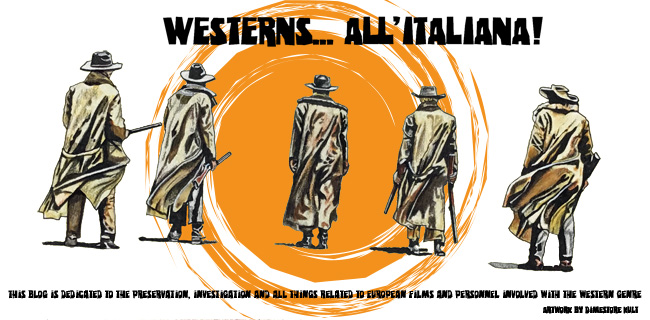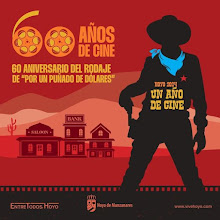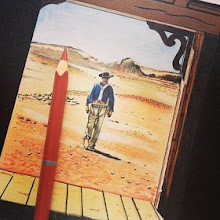By Valentin Maniglia
November 14, 2017
On the occasion of the Release at Specific Bis / The
Omega Productions of the sublime vinyl edition of the soundtrack of the Lac des
Morts Vivants by Jean Rollin, signed Daniel J. White, we decided to tell you a
little about this composer who is not like!
French cinema, in its long and brilliant history, will
have known great artists but perhaps more than any other country is equally
adept at leaving behind characters with careers and fascinating talents. In his
indispensable documentary Journey through the French cinema, Bertrand Tavernier
undertakes a work of the collective memory, a cinephile and popular duty that
redempts the coat of arms of a whole section of the French cinema completely
hidden from its own history, just as it does for some directors and composers.
Music occupies an important place in his film but, as Tavernier pointed out in
an interview, France has, for a very long time, lacked a policy of recording
the soundtracks, which makes it unavailable again today. a very large part of
the music composed over more than half a century of French cinema, whether
minor productions or classics. And by disappearing, composers also evaporate
from history. Jean-Jacques Grünewald, Paul Misraki, Maurice Jaubert ... All
these immense talents practically impossible to discover on any audio support,
due to non-existent recordings and missing scores.
Among the immense underground world of composers of
French cinema, there is one that remains largely forgotten.
Multi-instrumentalist having started, as many, as a pianist in jazz post-war
cabarets of the capital, Daniel J. White will have signed, between the late
1940s and his death, in 1997, more than one hundred and thirty original bands
as well as an endless list of albums dominated by an impressive collection of
library music then published at Montparnasse 2000. A true stakhanovist of
composition, White often worked throughout the 1950s for Raoul André's comedies
and cops. with one of the great forgotten French cinema, Edmond T. Gréville. As
the history of colonial France has forgotten many things, it also removed the
Patrouille de choc (1957), first film of Claude Bernard-Aubert and first cinematographic
attempt to speak frontally of the Indochina war. Extremely realistic -
Bernard-Aubert, like Pierre Schoendoerffer, was a war reporter in Indochina -
hard and controversial, Patrouille de choc could have revealed a great
disruptive filmmaker in the French landscape, but his problems with censorship
will have because of him; after several feature films dealing with subjects
virtually impossible to discuss in De Gaulle's France, such as war or racism -
in the very curious The guts in the sun (1959) and The cowards live of hope
(1961) - Bernard- Aubert bury himself in pornographic productions before
retiring from the world of cinema. With him, his first film is forgotten. And
with this work, also disappears the score of Patrouille de choc, probably one of
the most masterful works of Daniel White for the cinema.
The meeting at the end of the 1950s between White and the
producer Marius Lesoeur, founder of the legendary production box Eurociné, will
be decisive for the rest of the composer's career. From then until his death,
Daniel J. White will be one of the main composers of the Eurociné productions,
which obviously implies a long collaboration with the artistic pillar of the
studio, the hilarious Jess Franco, the following - even productions Marius Lesoeur.
With Sadique Baron Von Klaus (1962) starts a long friendship between the
composer and the director on a hundred projects, Franco, also a composer and
jazzman, often collaborate in pairs with White. After his death, Franco will
continue to use the compositions of the latter in his work until his last in
2012. In truth, White will have, on the scale of this colossal collaboration,
quite little made-to-measure, Franco especially to tap into his endless
collection of library music, but the dimension that his music offers is
remarkably consistent, delivering even a personal and arty depth. But the
sensibilities of Franco the musician and that of Franco the filmmaker intersect
at the precise place where the work of Daniel J. White intervenes. Evidenced by
the rippling of his art which, from the sublime strings tormented and
melancholy of the soundtrack of the Countess topless (1974) to the joviality of
the multiple themes with piano bar accents that Franco will use as well as
saloon music in The Jaguar (1963), as cabaret music in The Fall of the Eagles
(1989) or as themes to the atmosphere "happy bites" in many of his
pornographic tapes.
[Daniel J. White et Jess Franco dans Le Diabolique Docteur
Z (1965)]
The richness of Daniel J. White's work is infinite. By
composing, reworking - many themes composed for a Eurociné film will be taken
up, reorchestrés, in the following films of Franco - parodiant - let's take a
single example: the theme of Sumuru, the city without men (1969) is an
excellent song of credits for a James Bond-like - or imagining - Don Quixote of
Orson Welles, completed and edited in 1992 by Franco - Daniel White is of all
genres, all styles. We may regret the lack of its name in the credits of some
of the most beautiful pieces of the filmography of Jess Franco (his German
feature films Soledad Miranda period which show excellent psyche fiber and arty
from of the Spanish filmmaker), who would have deserved the involvement of a
prolific and diversified musician like him. And if one does not remember him
much more than the soundtrack of Belle et Sébastien (1965), his work, almost
impossible to form in its most complete appearance, shows a real passion for
music, instruments , melodies, and the use that can be made of them.
Today, the two independent labels Specific Recordings -
through their little new the sub-label Specific Bis, dedicated to the exciting
reunion of original soundtracks from French cinema and exploitation - and The
Omega Productions join forces. Their first release, available since the end of
October, is a tribute to the work of Daniel J. White who, twenty years after
his death, is experiencing for the very first time the release, on vinyl, of
one of his many soundtracks which is not neither more nor less than that of the
Lake of the Living Dead (1981), legend among the legends in the curious
landscape of the French nanar. It is Jean Rollin who, twenty-four hours before
the start of the shooting, replaces Jess Franco to the realization - he will
sign the film under the pseudonym J. A. Lazer - of what is today a nanardesque
pearl of choice. The work of Specific Bis and Omega is thorough and daring. On
no less than twenty-three titles, the full soundtrack is available, featuring
all of Daniel White's tracks and his synthesizer-inspired use, as well as some
of the unmissable replicas of this cult nanar, the glorious 'Promizoulin,
Finish' -in ! " on your mind. The accomplishment is impeccable:
masterfully led by true enthusiasts, this outing is a vibrant tribute to the
work of Daniel J. White. On the stage, the BO of the Living Dead Lake takes on
a whole new dimension than that of the soundtrack of nanar we know him:
experimental synths engulf music in a chimerical atmosphere that will be
visited in turn horror, the love, dread and death, cleverly protecting this
obsolete aura worn by remarkable yet delightfully kitsch arrangements. This may
not be the best gateway to Daniel White's work, but we will not find a better
way to discover the electronic facet of his work than to get this record, the
result of long-term work on the part of our two passionate labels.
All his life, Daniel J. White, has not ceased to compose.
Not for glory, which he never knew, neither for the money he never benefited
from, but for work, and, no doubt, for the satisfaction he derived from the
accomplishment of his labors . If only for this, he deserved to be
rediscovered, against all the obstacles between his work and his diffusion, the
inexistence of his recordings first. Daniel J. White, who has never claimed to be
anything but a musician, was the first mad scientist in French film music, an
outstanding experimenter, able to immerse himself in all genres, styles, all
the innovations.
______________
The soundtrack of Living Dead Lake is available on CD
(limited to 500 copies) at The Omega Productions and Vinyl at Specific Bis /
The Omega Productions in two versions: a standard version, whose cover features
the original film, and a limited edition "swamp green" color vinyl
featuring a sublime artwork by Jennie Zakrzewski, available on the Internet and
at your best record stores.
Link to original article: http://faispasgenre.com/2017/11/daniel-white-compositeur/
Link to original article: http://faispasgenre.com/2017/11/daniel-white-compositeur/














No comments:
Post a Comment